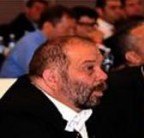Fonte:
www.inach.net
Autore:
Ronald Eissens
Social Media not doing very well in online hate removal probe.
Results of six-weeks monitoring exercise by the International Network Against Cyber Hate (INACH) and other NGOs in cooperation with the European Commission shows Facebook, Twitter and YouTube need to improve their performance in a major way.
On December 7, the EU HIGH LEVEL GROUP ON COMBATING RACISM, XENOPHOBIA AND OTHER FORMS OF INTOLERANCE met in Brussels to present and discuss the first results of the EU-Social media Code of Conduct on countering illegal hate speech online.
The exercise, requested by the EC to check Progress on the implementation of the Code of Conduct was signed with the Social Media in May this year and was done by members of the International Network Against Cyber hate (INACH) and other NGOs (see factsheet). INACH devised the methodology for the monitoring together with the EC.
During the meeting, Tamas Berecz and Ronald Eissens spoke on behalf of INACH. Also INACH members (Steffen Eisentraut from Jugendschutz, Dina Milandi from ZARA and Gilles Bloch from LICRA) made contributions.
The results, which can be found in the facsheet, do not look good, both on timing and on percentage of removal by the Social Media. Only in 40% of the cases notifications of online hate brought to the Social Media by Civil Society were assessed within the 24 hours which Twitter, YouTube and Facebook committed to. The percentage of take down/removal is even worse; 28,2 % The social media companies could have done a lot better and should have done a lot better. Their response came down to the usual promise to do better. Vera Jourova, Commissioner for Justice, Consumers and Gender Equality of the European Commission emphazied the need to curb online hate speech and said that she hoped things would improve in future.
Since the Social Media do not want to supply their own data on online hate and removal to the Commission or Civil Society, the monitoring and negotiation process is bound to be long and leaves much to be guessed, but logically, there are only two possibilities: It is either a matter of capacity (then the social media should decide to spend more money on staff) or it is a matter of knowledge (then they should get better training for their staff).
At the end of the meeting it was decided to do a second monitoring exercise in 2017.


